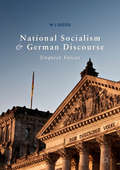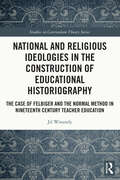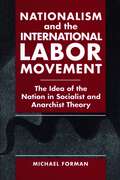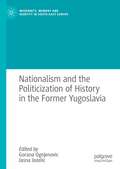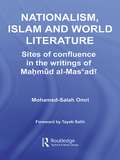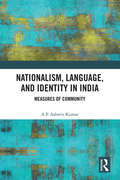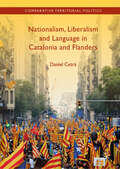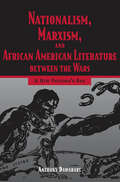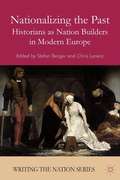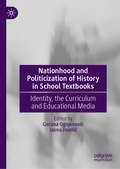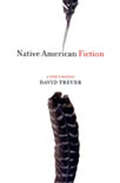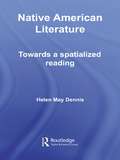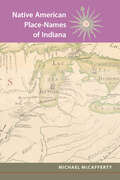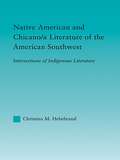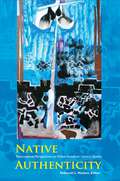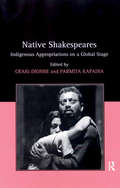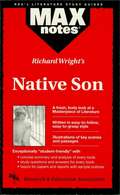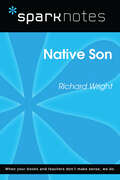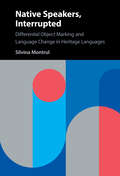- Table View
- List View
National Socialism and German Discourse: Unquiet Voices
by W J DoddIn this discourse history, W J Dodd analyses the ‘unquiet voices’ of opponents whose contemporary critiques of Nazism, from positions of territorial and inner exile, focused on the ‘language of Nazism’. Individual chapters review ‘precursor’ discourses; Nazi public discourse from 1933 to 1945; the testimonies of ‘unquiet voices’ abroad, and in private and published texts in the ‘Reich’; attempts to ‘denazify the language’ (1945-49), and the legacies of the Nazi past in a retrospective discourse of ‘coming to terms’ with the Nazi past. In the period from 1945, the book focuses on contestations of ‘tainted language’ and instrumentalizations of the Nazi past, and the persistence of linguistic taboos in contemporary German usage. Highly engaging, with English translations provided throughout, this book will provide an invaluable resource for scholars of discourse analysis, sociolinguistics, and German history and culture; as well as readers with a general interest in language and politics.
National and Religious Ideologies in the Construction of Educational Historiography: The Case of Felbiger and the Normal Method in Nineteenth Century Teacher Education (Studies in Curriculum Theory Series)
by Jil WinandyDocumenting the reception of the pre-eminent Austrian school reformer Johann Ignaz Felbiger and his pedagogical thought in European histories of education in the nineteenth century, this volume demonstrates how national and religious ideological preferences have propelled the construction of fundamental biases in educational historiography. Covering more than 200 years and multiple national contexts, this book’s case studies of France and Switzerland, as well as close analysis of historical documents and textbooks, reveal how a canon of glorified historical "heroes" have been promoted over and above other educational actors, with the aim of morally instructing future teachers according to national and religious values. Based on a strong array of historical sources, the author demonstrates how biased educational historiographies are utilized in gaining support for certain pedagogical and curricula models. Through the deep examination of textbooks used in teacher training and the explication of the work and actual influence of Felbiger’s method in Catholic parts of Europe, this book captures how these narratives impact our understanding of early national histories. Offering new knowledge in the history of curriculum studies, this volume will be of interest to scholars and researchers with an interest in the history of education, as well as comparative teacher education.
Nationalism and the International Labor Movement: The Idea of the Nation in Socialist and Anarchist Theory (G - Reference, Information and Interdisciplinary Subjects)
by Michael FormanThe resurgence of nationalism accompanying the decline of Communism has been taken to indicate the failure of socialist theory to grasp the nature of this phenomenon. Against both those who argue that the radical tradition has ignored and underestimated nationalism and those who accuse it of economic reductionism, this careful analysis of the idea of the nation as it was developed in the work of the major thinkers of the international labor movement reveals evidence of how seriously they grappled with nationalism.Each of the main sections of the book focuses on the most influential theorists of the international labor movement as it became organized and grew: Bakunin, Marx, and Engels and the concern of the First International (1864–1876) with class solidarity across political borders; Lenin, Luxemburg, and Bauer and the preoccupation of the Second International (1889-1914) with socialism in ethnically plural societies; Stalin and Gramsci in relation to the substitution by the Third International (1919–1943) of nation-building and national liberation for the old class project.In the conclusion, the author examines the relationships among ethnic and civic nationality, national self-determination, republican institutions, and the process of globalization from the perspective of the post-Soviet era and in the light of social theory and Kant's ideas about cosmopolitan right.
Nationalism and the Politicization of History in the Former Yugoslavia (Modernity, Memory and Identity in South-East Europe)
by Gorana Ognjenovic Jasna Jozelic“This book is very timely: the instrumentalization of history for political goals has become a pressing issue and worrisome feature of many polities, to the point of challenging even the most consolidated democracies. Focusing on Yugoslavia’s fragile successor states, the authors explore plurifold analytical levels, including local, regional, transnational, European and global perspectives. The authors comprehensively demonstrate how politicizing history, in the postwar and postcommunist societies of what was once Yugoslavia, has prevented both reconciliation and democratization.”—Sabine Rutar, Leibniz Institute for East and Southeast European Studies, Germany“Ognjenovic and Jozelic focus here on the former Yugoslavia before and after its fragmentation to explore and evaluate the various uses of histories by nationalists, both those who promoted ‘federal nationalism’ and those who peddle specific local nationalisms in successor states. The book deals specifically with the Western Balkans, but these developments have their parallels in many other parts of the world, and the book will be useful well beyond the region on which the study is based.”—Paul Mojzes, Professor Emeritus, Rosemont College, USA“The former Yugoslavia has become a battlefield for the ‘Memory Wars’, in spite of the wealth of judicially established facts and available evidences gathered about the atrocities in the region, and various initiatives aimed at dealing with the past and efforts at transitional justice. Focusing on three periods of Yugoslav history – the Second World War, socialist Yugoslavia and the Yugoslav wars of 1991–2001 – the contributors show that despite these efforts to deal with the past, sustainable peace and reconciliation across ethnic and religious groups remain a distant aim.” —Marijana Toma, Center for Cultural Decontamination, SerbiaThis book analyzes how nationalists in the former Yugoslavia have politicized history to further their political agendas, retaining and prolonging conflict among different cultural and religious groups, and impeding the process of lasting reconciliation. It explores how narratives have been (mis)used, drawing on examples from all of the former Yugoslav republics. With contributors from a range of disciplinary backgrounds, it provides a vital assessment of how nationalists have attempted to (re)shape public collective memory and relativize facts.
Nationalism, Islam and World Literature: Sites of Confluence in the Writings of Mahmud Al-Mas’adi (Routledge Studies in Middle Eastern Literatures)
by Mohamed-Salah OmriThe writer and politician Mahmud al-Mis’adi is a figure of prime importance in the development of North African literature and cultural politics since the last war. This fascinating book covers both his essays and fiction, written between the 1930s and 1990s, which challenge the boundaries between the sacred and irreligious in the Islamic world. In addition, it also examines Arabic literature and its relationship to the West.
Nationalism, Language and Identity in India: Measures of Community
by A P KumarThis book examines linguistic nationalism in India. It focuses on the emergence of language as a marker of identity by analysing themes such as Linguistic Reorganization of States, nationalism, philology, and linguistic identity. Formulating a novel conception of doxastic nature of community experience, the author presents a theory about nationalism as a cultural phenomenon by studying the constraints of western theological apparatuses that limit our understanding of it. The book looks at how an ecclesiastical notion of community is at the heart of the debate around linguistic and national identity – something that is redefining politics the world over. This volume will be useful for scholars and researchers of political studies, political sociology, sociology, historical linguistics and cultural studies.
Nationalism, Liberalism and Language in Catalonia and Flanders (Comparative Territorial Politics)
by Daniel CetràIs liberalism really compatible with nationalism? Are there limits to linguistic nation-building policies? What arguments justify the imposition of national languages? This book addresses these questions by examining the linguistic disputes in Catalonia and Flanders, two major cases of sub-state nationalism. The book connects two strands of arguments: the political arguments around contested linguistic policies, drawing on a rich set of primary and secondary sources, and the theoretical arguments around liberalism and nationalism. The study also compares the historical trajectory and political dynamics of Catalan and Flemish nationalism. It shows that the relationship between language and nationhood is politically constructed through state nation-building and minority activism. The findings highlight the relevance and pervasiveness of nationalism in contemporary social and political life. This book will appeal to scholars and upper-level students interested in nationalism, contemporary political theory, the politics of language, and comparative territorial politics.
Nationalism, Marxism, and African American Literature between the Wars: A New Pandora's Box
by Anthony DawahareDuring and after the Harlem Renaissance, two intellectual forces—nationalism and Marxism—clashed and changed the future of African American writing. Current literary thinking says that writers with nationalist leanings wrote the most relevant fiction, poetry, and prose of the day. Nationalism, Marxism, and African American Literature Between the Wars: A New Pandora's Box challenges that notion. It boldly proposes that such writers as A. Philip Randolph, Langston Hughes, and Richard Wright, who often saw the world in terms of class struggle, did more to advance the anti-racist politics of African American letters than writers such as Countee Cullen, Jessie Redmon Fauset, Alain Locke, and Marcus Garvey, who remained enmeshed in nationalist and racialist discourse. Evaluating the great impact of Marxism and nationalism on black authors from the Harlem Renaissance and the Depression era, Anthony Dawahare argues that the spread of nationalist ideologies and movements between the world wars did guide legitimate political desires of black writers for a world without racism. But the nationalist channels of political and cultural resistance did not address the capitalist foundation of modern racial discrimination. During the period known as the “Red Decade” (1929–1941), black writers developed some of the sharpest critiques of the capitalist world and thus anticipated contemporary scholarship on the intellectual and political hazards of nationalism for the working class. As it examines the progression of the Great Depression, the book focuses on the shift of black writers to the Communist Left, including analyses of the Communists' position on the “Negro Question,” the radical poetry of Langston Hughes, and the writings of Richard Wright.
Nationalizing the Past
by Stefan Berger Chris LorenzHistorians traditionally claim to be myth-breakers, but national history since the nineteenth century shows quite a record in myth-making. This exciting new volume compares how national historians in Europe have handled the opposing pulls of fact and fiction and shows which narrative strategies have contributed to the success of national histories. <P><P><i>Advisory: Bookshare has learned that this book offers only partial accessibility. We have kept it in the collection because it is useful for some of our members. To explore further 10access options with us, please contact us through the Book Quality link. Benetech is actively working on projects to improve accessibility issues such as these.</i>
Nationhood and Politicization of History in School Textbooks: Identity, the Curriculum and Educational Media
by Gorana Ognjenović Jasna JozelićThis book explores how school history textbooks are used to perpetuate nationalistic policies within divided regions. Exploring the ‘divide and rule’ politics across ex-Yugoslav successor states, the editors and contributors draw upon a wide range of case studies from across the region. Textbooks and other educational media provide the foundations upon which the new generation build understanding about their own context and the events that are creating their present. By promoting nationalistic politics in such media, textbooks themselves can be used as tools to further promote and preserve ongoing hostility between ethnic groups following periods of conflict. This edited collection will appeal to scholars of educational media, history education and post-conflict societies.
Native American Fiction: A User's Manual
by David TreuerAn entirely new approach to reading, understanding, and enjoying Native American fictionThis book has been written with the narrow conviction that if Native American literature is worth thinking about at all, it is worth thinking about as literature. The vast majority of thought that has been poured out onto Native American literature has puddled, for the most part, on how the texts are positioned in relation to history or culture.Rather than create a comprehensive cultural and historical genealogy for Native American literature, David Treuer investigates a selection of the most important Native American novels and, with a novelist's eye and a critic's mind, examines the intricate process of understanding literature on its own terms.Native American Fiction: A User's Manual is speculative, witty, engaging, and written for the inquisitive reader. These essays—on Sherman Alexie, Forrest Carter, James Fenimore Cooper, Louise Erdrich, Leslie Marmon Silko, and James Welch—are rallying cries for the need to read literature as literature and, ultimately, reassert the importance and primacy of the word.
Native American Literature: Towards a Spatialized Reading (Routledge Transnational Perspectives on American Literature)
by Helen May DennisNative American Literature underwent a Renaissance around 1968, and the current canon of novels written in the late twentieth century in American English by Native American or mixed-blood authors is diverse, exciting and flourishing. Despite this, very few such novels are accepted as part of the broader American literary canon. This book offers a valuable and original approach to contemporary Native American literature. Dennis’s contemplation of space and spatialized aesthetics is compelling and persuasive. Considering Native American literature within a modernist framework, and comparing it with writers such as Woolf, Stein, T.S Eliot and Proust results in a valuable and enriching context for the selected texts. Vital reading for scholars of Native American Literature, this book will also provide good grounding in the subject for those with an interest in American and twentieth century literature more generally.
Native American Place Names of Indiana
by Michael McCaffertyA linguistic history of Native American place-names in Indiana In tracing the roots of Indiana place names, Michael McCafferty focuses on those created and used by local Native Americans. Drawing from exciting new sources that include three Illinois dictionaries from the eighteenth century, the author documents the language used to describe landmarks essential to fur traders in Les Pays d’en Haut and settlers of the Old Northwest territory. Impeccably researched, this study details who created each name, as well as when, where, how and why they were used. The result is a detailed linguistic history of lakes, streams, cities, counties, and other Indiana names. Each entry includes native language forms, translations, and pronunciation guides, offering fresh historical insight into the state of Indiana.
Native American and Chicano/a Literature of the American Southwest: Intersections of Indigenous Literatures (Indigenous Peoples and Politics)
by Christina M. HebebrandThis book studies Native American and Chicano/a writers of the American Southwest as a coherent cultural group with common features and distinct efforts to deal with and to resist the dominant Euro-American culture.
Native Americans: A Changing Landscape (Amplify Core Knowledge Language Arts Reader)
by Amplify Learning<P>Unit 8 includes Native American myths and stories from different tribes as well as nonfiction accounts. <P>"The Reader also includes two selections that may be used for enrichment. “The Navajo Code Talkers” explores the unique role Native Americans played during World War II, and “Ancestors’ Words” discusses the struggle to transmit and preserve the diverse languages spoken by Native Americans." (TG, Unit 8, p. 3)
Native Americans: Activity Book (Amplify Core Knowledge Language Arts, Grade 5 #Unit 8)
by Amplify EducationNIMAC-sourced textbook
Native Americans: Reader (Amplify Core Knowledge Language Arts, Grade 5 #Unit 8)
by Amplify EducationNIMAC-sourced textbook
Native Authenticity: Transnational Perspectives on Native American Literary Studies (SUNY series, Native Traces)
by Deborah L. MadsenAn indispensable resource for readers, students, and scholars of Native literatures in North America, Native Authenticity offers a clear, comprehensive, and systematic look at the diversity of critical approaches to the idea of "Indian-ness." Some of the foremost transatlantic scholars of Native Studies in North America and Europe share their insights on this highly-charged aspect of the contemporary theoretical field of Native Studies. The issue of "authenticity" or "Indian-ness" generates a controversial debate in studies of indigenous American literatures. The articulation of Native identity through the prism of Euro-American attempts to confine "Indian" groups to essentialized spaces is resisted by some Native writers, while others recognize a need for essentialist categories as a key strategy in the struggle for social justice and a perpetually renewed sense of Native sovereignty. Pressure from neo-colonial essentializing practices is in conflict with a politics of cultural sovereignty, which demands a notion of "Indian" essence or "authenticity" as a foundation for community values, heritage, and social justice. Contributors participate in a scholarly and pedagogical search for an intellectual paradigm for Native literary studies that is apart from, yet cognizant with, powerful colonial legacies. The complex politics of Polynesian authenticity versus Native indigeneity is engaged by Native Hawaiian writers as they negotiate conflicting demands upon personal and tribal identities. Related to this questioning is the authenticity debate in Canadian First Nations writing, where the claim to authenticity rests upon a claim to historical precedence; also related is the highly contentious claim by some Chicano/a writers to an indigenous heritage as a claim to authority and "American" authenticity. Essays in this volume are focused upon the diverse and sophisticated responses of Native writers and scholars, while offering comparative perspectives on Native Hawaiian, Chicano, and Canadian literatures.
Native Provenance: The Betrayal of Cultural Creativity
by Prof. Gerald VizenorGerald Vizenor’s Native Provenance challenges readers to consider the subtle ironies at the heart of Native American culture and oral traditions such as creation and trickster stories and dream songs. A respected authority in the study of Native American literature and intellectual history, Vizenor believes that the protean nature of many creation stories, with their tease and weave of ironic gestures, was lost or obfuscated in inferior translations by scholars and cultural connoisseurs, and as a result the underlying theories and presuppositions of these renditions persist in popular literature and culture.Native Provenance explores more than two centuries of such betrayal of native creativity. With erudite and sweeping virtuosity, Vizenor examines how ethnographers and others converted the inherent confidence of native stories into uneasy sentiments of victimry. He explores the connection between Native Americans and Jews through gossip theory and strategies of cultural survivance, and between natural motion and ordinary practices of survivance. Other topics include the unique element of native liberty inherent in artistic milieus; the genre of visionary narratives of resistance; and the notions of historical absence, cultural nihilism, and victimry.Native Provenance is a tour de force of Native American cultural criticism ranging widely across the terrains of the artistic, literary, philosophical, linguistic, historical, ethnographic, and sociological aspects of interpreting native stories. Native Provenance is rife with poignant and original observations and is essential reading for anyone interested in Native American cultures and literature.
Native Shakespeares: Indigenous Appropriations on a Global Stage
by Parmita KapadiaExplored in this essay collection is how Shakespeare is rewritten, reinscribed and translated to fit within the local tradition, values, and languages of the world's various communities and cultures. Contributors show that Shakespeare, regardless of the medium - theater, pedagogy, or literary studies - is commonly 'rooted' in the local customs of a people in ways that challenge the notion that his drama promotes a Western idealism. Native Shakespeares examines how the persistent indigenization of Shakespeare complicates the traditional vision of his work as a voice of Western culture and colonial hegemony. The international range of the collection and the focus on indigenous practices distinguishes Native Shakespeares from other available texts.
Native Son (MAXNotes Literature Guides)
by Richard BucciREA's MAXnotes for Richard Wright's Native Son MAXnotes offer a fresh look at masterpieces of literature, presented in a lively and interesting fashion. Written by literary experts who currently teach the subject, MAXnotes will enhance your understanding and enjoyment of the work. MAXnotes are designed to stimulate independent thought about the literary work by raising various issues and thought-provoking ideas and questions. MAXnotes cover the essentials of what one should know about each work, including an overall summary, character lists, an explanation and discussion of the plot, the work's historical context, illustrations to convey the mood of the work, and a biography of the author. Each chapter is individually summarized and analyzed, and has study questions and answers.
Native Son (SparkNotes Literature Guide Series)
by SparkNotesNative Son (SparkNotes Literature Guide) by Richard Wright Making the reading experience fun! Created by Harvard students for students everywhere, SparkNotes is a new breed of study guide: smarter, better, faster. Geared to what today's students need to know, SparkNotes provides: *Chapter-by-chapter analysis *Explanations of key themes, motifs, and symbols *A review quiz and essay topicsLively and accessible, these guides are perfect for late-night studying and writing papers
Native Speakers and Native Users: Loss and Gain
by Alan Davies'Native speakers' and 'native users' are terms traditionally used to differentiate between speakers who have acquired a language from birth and speakers who have learnt a second language. This book highlights the problems associated with making such a clear cut distinction. By analysing a range of literature, language uses, and proficiency tests, Davies argues that there is no significant difference between native speakers and native users, and emphasises the importance of the Standard Language. Whilst individual native speakers may vary considerably, the academic construct of the native speaker is isomorphic with the Standard Language which is available to both native speakers and native users through education. In this book, Davies explores the 'native user', as a second language speaker who uses language with 'native speaker' competence. This book will be of significant interest to students and researchers working in the fields of second language acquisition and applied linguistics.
Native Speakers, Interrupted: Differential Object Marking and Language Change in Heritage Languages
by Silvina MontrulA heritage language is the term given to a language spoken at home by bilingual children of immigrant parents. Written by a leading figure in the field, this pioneering, in-depth study brings together three heritage languages – Hindu, Spanish and Romanian - spoken in the United States. It demonstrates how heritage speakers drive morphosyntactic change when certain environmental characteristics are met, and considers the relationship between social and cognitive factors and timing in language acquisition, bilingualism, and language change. It also discusses the implications of the findings for the language education of heritage speakers in the USA and considers how the heritage language can be maintained in the English-speaking school system. Advancing our understanding of heritage language development and change, this book is essential reading for students and researchers of linguistics and multilingualism, immigration, education studies and language policy, as well as educators and policy makers.
